Some Do Not … by Ford Madox Ford (story read aloud txt) 📕

- Author: Ford Madox Ford
Book online «Some Do Not … by Ford Madox Ford (story read aloud txt) 📕». Author Ford Madox Ford
“Intermittent!” was the word. “Intermittently functioning!”
At one point the boy had broken from them and run with astonishing velocity along the dull wood paving of an immense empty street. When they had caught him up he had been haranguing under black hanging trees, with an Oxford voice, an immobile policeman:
“You’re the fellows!” he’d been exclaiming, “who make old England what she is! You keep the peace in our homes! You save us from the vile excesses. …”
Tietjens himself he had always addressed with the voice and accent of a common seaman; with his coarsened surface voice!
He had the two personalities. Two or three times he had said:
“Why don’t you kiss the girl? She’s a nice girl, isn’t she? You’re a poor b⸺y Tommie, ain’t cher? Well, the poor b⸺y Tommies ought to have all the nice girls they want! That’s straight, isn’t it? …”
And, even at that time they hadn’t known what was going to happen. … There are certain cruelties. … They had got a four-wheel cab at last. The drunken boy had sat beside the driver; he had insisted. … Her little, pale, shrunken face had gazed straight before her. … It hadn’t been possible to speak; the cab, rattling all over the road had pulled up with frightful jerks when the boy had grabbed at the reins. … The old driver hadn’t seemed to mind; but they had had to subscribe all the money in their pockets to pay him after they had carried the boy into the black house. …
Tietjens’ mind said to him:
“Now when they came to her father’s house so nimbly she slipped in, and said: ‘There is a fool without and there is a maid within. …’ ”
He answered dully:
“Perhaps that’s what it really amounts to. …” He had stood at the hall door, she looking out at him with a pitiful face. Then from the sofa within the brother had begun to snore; enormous, grotesque sounds, like the laughter of unknown races from darkness. He had turned and walked down the path, she following him. He had exclaimed:
“It’s perhaps too … untidy …”
She had said:
“Yes! Yes … Ugly … Too … oh … private!”
He said, he remembered:
“But … forever …”
She said, in a great hurry:
“But when you come back. … Permanently. And … And … oh, as if it were in public.” … “I don’t know,” She had added. “Ought we? … I’d be ready. …” She added: “I will be ready for anything you ask.”
He had said at some time: “But obviously. … Not under this roof. …” And he had added: “We’re the sort that … do not!”
She had answered, quickly too:
“Yes—that’s it. We’re that sort!” And then she had asked: “And Ethel’s party? Was it a great success?” It hadn’t, she knew, been an inconsequence. He had answered:
“Ah … That’s permanent. … That’s public. … There was Rugeley. The Duke … Sylvia brought him. She’ll be a great friend! … And the President of the … Local Government Board, I think … And a Belgian … equivalent to Lord Chief Justice … and, of course, Claudine Sandbach. … Two hundred and seventy; all of the best, the modestly-elated Guggumses said as I left! And Mr. Ruggles … Yes! … They’re established. … No place for me!”
“Nor for me!” she had answered. She added: “But I’m glad!”
Patches of silence ran between them; they hadn’t yet got out of the habit of thinking they had to hold up the drunken brother. That had seemed to last for a thousand painful months. … Long enough to acquire a habit. The brother seemed to roar: “Haw—Haw—Kuryasch. …” And after two minutes: “Haw—Haw—Kuryasch. …” Hungarian, no doubt!
He said:
“It was splendid to see Vincent standing beside the Duke. Showing him a first edition! Not of course quite the thing for a, after all, wedding party! But how was Rugeley to know that? … And Vincent not in the least servile! He even corrected cousin Rugeley over the meaning of the word ‘colophon’! The first time he ever corrected a superior! … Established, you see! … And practically cousin Rugeley. … Dear Sylvia Tietjens’ cousin, so the next to nearest thing! Wife of Lady Macmaster’s oldest friend. … Sylvia going to them in their—quite modest!—little place in Surrey. … As for us,” he had concluded “they also serve who only stand and wait. …”
She said:
“I suppose the rooms looked lovely.”
He had answered:
“Lovely. … They’d got all the pictures by that beastly fellow up from the rectory study in the dining-room on dark oak panelling. … A fair blaze of bosoms and nipples and lips and pomegranates. … The tallest silver candlesticks of course … you remember silver candlesticks and dark oak. …”
She said:
“Oh, my dear … Don’t … Don’t!”
He had just touched the rim of his helmet with his folded gloves.
“So we just wash out!” he had said.
She said:
“Would you take this bit of parchment. … I got a little Jew girl to write on it in Hebrew: It’s ‘God bless you and keep you: God watch over you at your goings out and at …’ ”
He tucked it into his breast pocket.
“The talismanic passage,” he said. “Of course I’ll wear it. …”
She said:
“If we could wash out this afternoon. … It would make it easier to bear. … Your poor mother, you know, she was dying when we last …”
He said:
“You remember that … Even then you … And if I hadn’t gone to Lobscheid. …”
She said:
“From the first moment I set eyes on you. …”
He said:
“And I … from the first moment … I’ll tell you … If I looked out of a door … It was all like sand. … But to the half left a little bubbling up of water. That could be trusted. To keep on forever. … You, perhaps, won’t understand.”
She said:
“Yes! I know!”
“They were seeing landscapes. … Sand dunes; close-cropped. … Some negligible shipping; a stump-masted brig from Archangel. …”
“From the first moment,” he repeated.
She said:
“If we could wash out …”
He said, and for the first moment felt grand, tender, protective:
“Yes, you can,” he said. “You cut out from this afternoon, just before 4:58 it was when I said that to you and you consented … I heard the Horse Guards clock. … To now. … Cut it out; and join





Comments (0)